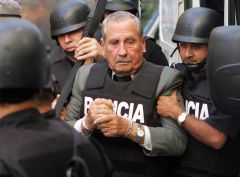By Patrick Vanderpool
Impunity Watch Reporter, South America

BUENAVENTURA, Colombia – The Colombian NGO Consultancy for Human Rights (CODHES) reports that Colombia is the country with the highest number of displaced people in the world, based on figures from a report published by the United Nations High Commissioner for Refugees (UNHCR).
According to the UNHCR report, approximately 3.7 million Colombian citizens have been displaced from their homes in the last five decades due to increasing violence from rebel groups, such as the FARC.
Jorge Rojas, Director of CODHES, stated “[t]he number of uprooted people in Colombia is higher than those in Iraq, Afghanistan and the Democratic Republic of Congo.” Ecuador and Venezuela were named as two countries that received the highest portion of displaced Colombians.
According to the report, about 600,000 Colombians live in Ecuador. The Ecuadorian government claims that that have spent $40 million in the past three years to address the displaced population.
The Colombian Government is receiving harsh criticism for their handling of the news. Initially, Colombia rejected reports that the country had the highest number of displaced peoples. According to Acción Social, the presidential agency in charge of displacement, the statements and figures contained in the report are “untrue”. Acción Social also claims that global data on displacement and refugees cannot be used to compare displacement between countries because there are multiple ways to calculate displacement.
According to Colombia Reports, an independent news organization, the true purpose of the report was not to establish a definitive figure on displaced people, but rather to highlight the gravity of an often overlooked humanitarian crisis, a claim that dulls Acción Social’s claim that research methodology acts to unfairly skew the figures. Colombia Reports goes on to point out that although high-intensity warfare is a “thing of the past” in Colombia, the UNHCR report illustrates that the country is experiencing a humanitarian disaster of “epic proportions”.
Colombia Reports also claims that Acción Social’s response is indicative of a much larger “national attitude of worrying too much about the country’s image and too little about its concrete problems.”
For more information, please see:
Pravda.ru – Colombia has the Highest Number of Displaced People in the World – 12 November 2010
Colombia Reports – Displacement is a Human Tragedy, not a Publicity Crisis – 11 November 2010
Colombia Reports – Colombia Rejects U.N. Report on Refugee Figures – 10 November 2010
Momento 24 – Colombia Displaces and Ecuador Receives Refugees by Violence – 9 November 2010

